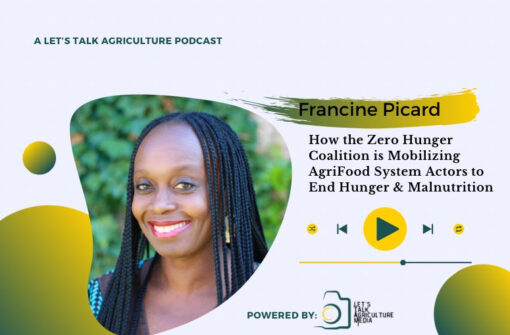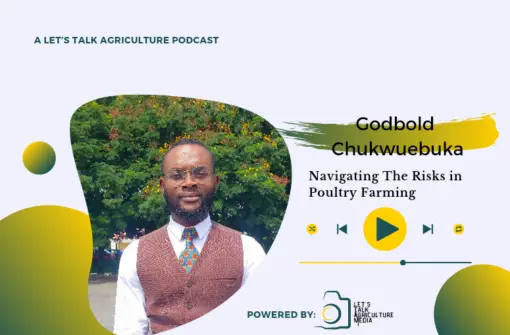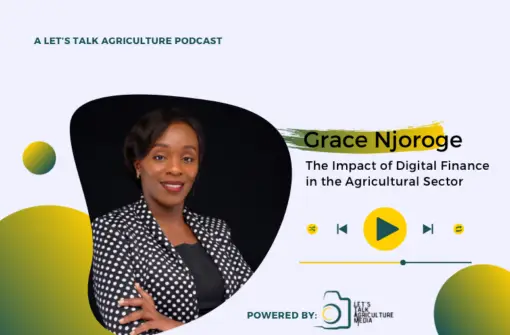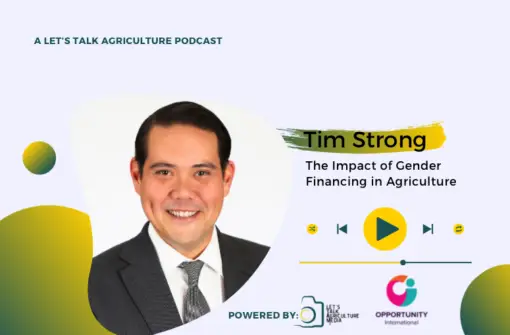Transcription
[00:00 – 00:12] Hello, beautiful people. Welcome to the first episode of the Let’s Talk Agriculture podcast show. The podcast that brings you the latest insights, trends and opportunities in the world of agriculture
[00:12 – 00:23] My name is Sharon Idahosa and I am your host for today’s episode and always. So I’m super thrilled to kick off the new year with our very first episode.
[00:23 – 00:31] As we step into 2024, the agriculture industry is brimming with exciting development.
[00:32 – 00:40] And in this episode, we will be delving into thought-provoking topics that are shifting in the future of agriculture.
[00:42 – 00:53] But before we dive into these discussions, I want to take a moment to express my gratitude to all of our listeners who have joined us in this.
[00:53 – 01:06] Agricultural journey, your support means the world to us and we are super committed to, you know, bring you engaging and informative content in every episode.
[01:06 – 01:18] So whether you are a seasoned farmer, an agricultural enthusiast, or simply just curious about the food on your table, this podcast is for you. So get ready.
[01:20 – 01:28] So without further ado, let’s get started. Let’s discuss agri-tourism and farm-to-table movement.
[01:28 – 01:37] Now there is a growing interest in agri-tourism and farm-to-table movement. And I thought to bring this episode your way.
[01:37 – 01:48] So in this episode, we will gradually take a look into agri-tourism and placing emphasis on the importance of connecting consumers with local food producers.
[01:50 – 02:00] So what is agri-tourism? So to me, agri-tourism is like a marriage between agriculture and tourism, considering how it offers us, you know,
[02:00 – 02:07] first-hand knowledge and opportunity to engage with the agricultural landscape. As I mentioned earlier,
[02:07 – 02:20] there is a growing interest in agri-tourism as well as farm-to-table movement because consumers are now seeking out locally sourced and fresh produce. You know,
[02:20 – 02:30] technologies came into the picture, like blockchain technology and it has a capability to trace where our food comes from.
[02:30 – 02:40] But I don’t believe it beats that first-hand connection we get from the farm-to-table movement. Not only do we know where our food comes from,
[02:40 – 02:52] but we also get to establish direct relationships with local farmers and producers. And that is the major idea behind agri-tourism. Moving from one place to the other,
[02:53 – 03:06] savouring the unique taste you can only get from fresh and local food. I mean, have you really experienced that? I really think you should.
[03:06 – 03:18] I mean, getting the sweet, savoury taste you get from fresh farm produce, I mean, you don’t want to miss that. So I really encourage you to do that. Now,
[03:18 – 03:31] let’s talk about the importance of connecting consumers with local food producers. Because this is something that cannot be overlooked. I mean, we can’t just really overstate this. I mean,
[03:31 – 03:41] this is something that everybody should know. And this is my number one point. So first of all,
[03:41 – 03:54] I believe that it can foster that transparency and trust that we seek. Because truth be told, not many of us are very comfortable not knowing where our food comes from.
[03:54 – 04:06] So if you’d like to know more about the food that you eat, where it comes from, why don’t you just consider the farm to table movement and agri-tourism? Because trust me when I tell you,
[04:06 – 04:15] you have a deeper understanding of the dedication and hard work that goes into food production.
[04:16 – 04:25] Because sometimes we tend to abuse something that we do not know about. So if you go there to experience it firsthand, you’ll know that it’s not just about the food. You’ll know the work that farmers,
[04:25 – 04:34] the local farmers put into the food production. And it will make you appreciate them more and to make you want to support them more.
[04:34 – 04:46] So I’ll really encourage you to try this out at some point in your life. And you’re really just going to experience please. I mean, trust me,
[04:46 – 04:59] food can give you so much joy and believe me when I tell you, if you try this out, you’re going to experience so much joy. Imagine nature with local food.
[04:59 – 05:11] I mean, my goodness, that’s not good there. So it doesn’t sound like I’m such a foodie, but I don’t think there’s anything wrong with being a foodie anyway. So I know that in most countries,
[05:11 – 05:23] many of the food that we used to eat has gone extinct and it is still moving at a faster rate. So embracing agri-tourism and the farm,
[05:23 – 05:30] the table movement will play a very crucial role in restoring the types, the, the, you know,
[05:30 – 05:42] the tipstery or flavors and the traditions that local agriculture has to offer. So if we try to embrace agri-tourism and the farm-to-table movement,
[05:43 – 05:53] most of those food that we, we no longer find in the cities, we can get to see them again. It will encourage the local farm, farmers,
[05:53 – 06:04] the local producers to continue producing those foods that we do not see in the urban areas as well. So your participation will help to, you know,
[06:04 – 06:17] promote more sustainable and resilient food system. I hope you enjoyed this episode because we’ve come to the end of today’s episode. And if you love it, don’t forget to share and subscribe.
[06:18 – 06:23] It will also be interesting to feature the stories of, um, local, local consumers,
[06:24 – 06:37] local food producers who have ripped the benefits of agri-tourism and farm to table movement. So if you know a local producer or a consumer,
[06:38 – 06:50] do well to send them our way, send them my way because I like to hear the voices. I like to put them out. So until next time, my name is Sharon Idahosa and I am your host.




